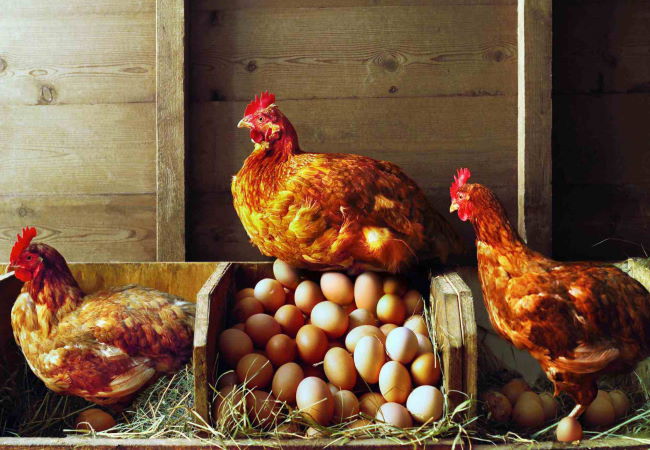+(256) 0707 792064
+(256) 0782 208 208
admin@conversionfeeds.com
conversionfeeds@gmail.com
Coronation Road, Plot 5, Old Kampala

Good Management Skills: Essential Tips For Layer Chicken
Layer chicken are prized for their egg production and therefore a farmer must be prepared to apply management skills to ensure that the health of his chicken is not compromised. Getting fresh eggs from the backyard farm of layers depends on good management skills so one must keep their layer chicken healthy in the process. Here are a few tips to manage a poultry brood well.
- Provide quality feed.
To keep your chickens productive and healthy, feed them the best food you can afford. The staple of their diet should be a premium laying mash or pellet, supplemented with occasional fresh fruit, green vegetables, meal worms and other healthy treats.
- Clean nest boxes frequently.
To encourage your chickens to lay, provide them with plenty of sanitary nest boxes layered with comfortable bedding. Recycled-newspaper pellets make a soft surface for hens to nestle and deposit their eggs and are easy to toss away and replace.
- Allow free-ranging.
Happy chicken lay more eggs and are more likely to stay healthy. If possible, let your chickens roam freely on your property. If this is not safe for them because of predators, consider using a covered exercise pen you can move around, which will allow them to “graze” on your lawn while still being protected from hawks and eagles.
- Supplement with calcium.
Egg-laying leeches a lot of calcium from a hen’s body. In addition to feeding a quality laying food, provide free-choice crushed oyster shells in a cup in the coop. Your hens will supplement their calcium as needed. Crushed oyster shells are available in feed stores that sell poultry supplies.
- Inspect chickens regularly.
Handle your hens whenever possible to examine their bodies, including combs, wattles, bills, feet and wings, for problems. Be on the lookout for infected wounds and broken bones. If you are concerned about your chickens’, don’t hesitate to take them to the vet. Avian veterinarians are often experienced in dealing with chicken issues. Before you even bring your chickens home, contact veterinarians in your area so you know who to go to in an emergency.
- Secure the coop.
Laying hens are particularly vulnerable to predators because of their reluctance to leave the nest. Make sure your coop is predator-proof to ensure raccoons, cats and other animals can’t gain access to your chickens. This means making sure latches can’t be opened by prying hands (raccoons are notorious for this) and the wire-mesh fencing is small enough that predators can’t reach through the bars to grab your chickens.
- Provide fresh water.
Chickens need constant access to water to stay healthy and productive. They will avoid water that isn’t clean and will go thirsty if they can’t find a fresh source. Provide your birds with fresh water every day.
- Control parasites.
External parasites love to prey on chickens. Mites are the biggest culprits and will take up residence in your coop without you ever noticing. Make it a habit to regularly inspect your chickens at night, when mites become active. If you see small, reddish-brown insects scurrying around on your chickens’ heads, treat your hens and your coop for mites. Chickens are best treated with a dose of ivermectin (available in injection form from an avian veterinarian), and the coop should be cleaned and dusted with food-grade diametreceous earth.
Other tips which work best for a backyard farmer are;
- Allow for good air circulation in your poultry house for egg laying bird
- Layer needs on average 120 gm of food per day
- Distribute food troughs and water troughs evenly (one basin/50 birds)
- Provide grit at 20 weeks, you give your birds small, loose particles of stone or sand.
- Laying nests must be kept in dark places, collect eggs 3 times a day, allow a nest for every 5 layer hens
- Provide soft clean litter
- Store eggs with the small end facing down
- Clean dirty eggs with steel wool/coarse leaves, Never wash your eggs
- Add greens to the diet of your layers and whenever possible vitamins to their water
- Debeak your layer chicken at the onset of egg laying
- Cull your Layers when egg production drops below 40%. To cull, simply means you start slaughtering your birds for meat.
